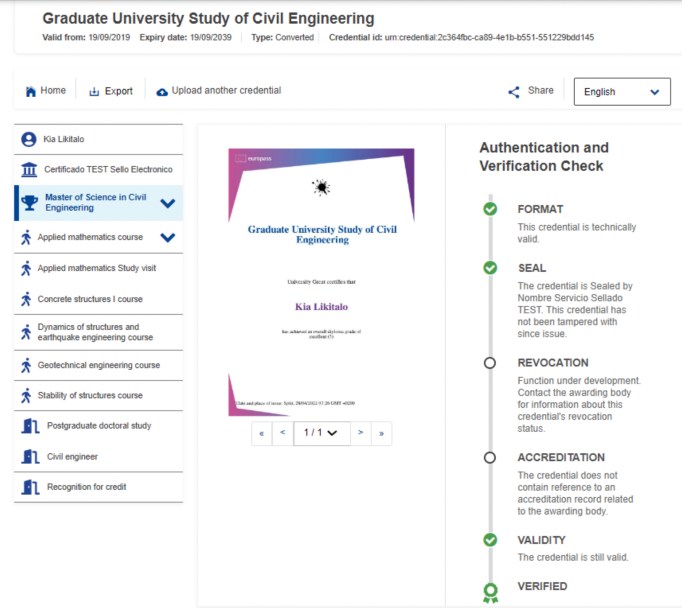How a national skills passport could help job seekers and employers


Having your credentials pre-verified when applying for a job could improve your chances of getting to the interview stage. Photo: Getty
The government is seeking public feedback on its proposed national skills passport, but what is it, and how is it supposed to help you?
In September, alongside the release of the Employment White Paper, the Australian government announced it would develop a business case for a national skills passport; the official public consultation period began last week.
The government says a skills passport could encourage upskilling and support job seekers by allowing Australians to upload and share their skills and qualifications from higher education and vocational education and training (VET) programs.
This would mean that when someone applies for a position, an employer would not have to confirm each qualification listed on the resume themselves.
Instead, they would be able to go to the applicant’s skills passport, “a trusted and integrated digital system”, which would confirm the applicant’s qualifications have been validated by “trusted sources”.
Ben Wheeler, director at people2people recruitment, said a national skills passport would streamline the job application process for job seekers and employers.
This would benefit all industries and job seekers by bringing all of the relevant information to one place.
“Employers do spend a fair amount of time having to verify, ‘Is this the right person, is this the right qualifications,’ and of course, they carry quite a large amount of risk in not doing so, or [not] getting that right,” Wheeler said.
“It slows down the process.
“But if we can have a central portal, which gives us some surety to say these credentials have been verified, I think that will be a big plus.”
Proven demand for a skills passport
The concept isn’t new; internationally, the European Union and countries such as Singapore have introduced their own skills passports.
In Australia, certain sectors and individual companies have also already developed their own forms of skills passports.
For example, job-search engine Seek owns Certsy, a digital service that job seekers can use to verify and store their credentials, and share that verified information when applying for jobs on Seek.

An example of how the EU’s Europass verifies the validity of credential documents uploaded by job seekers. Photo: TND/EU
Kadi Taylor, head of government relations and economics at Seek, said 2.5 million Australian and New Zealander job seekers on Seek have used Certsy to verify more than 4.8 million credentials ranging from their identity, to work rights and licences.
“We know it works because we have the data that says job seekers with at least three verified credentials – so maybe a driver’s licence, their right to work here in Australia and university degree, for example – are 25 per cent more likely to get shortlisted than an unverified candidate,” she said.
“And 80 per cent of [hirers on Seek] say that [a verified credential] helps their hiring process.”
Taylor said the government’s skills passport could improve on pre-existing ones by working with companies that are already embedded in the process.
The government also needs to set standards for all credentials to be verifiable and shareable, including micro-credentials.
Micro-credentials are not awarded by accredited higher education or training providers, and may range from short courses at private providers to training by previous employers that provided skills but not formal qualifications.
Gartner HR Advisory APAC senior principal Jasleen Kaur said prioritising skills required to achieve the outcomes of a job give both employers and job candidates flexibility.
“We have been looking into ‘skills-based recruiting’ and focusing on defining skills [and] outcomes needed for the job over education or number of years of experience in X industry,” she said.
“While there’s no quantifiable data available to support its benefit, we know from clients that this approach allows for organisations to access a larger candidate pool while hiring better quality talent.”
Data safety concerns
The government is in the very early stages of investigating and developing a national skills passport.
No time frame has been given regarding when a final product may be made available.
Wheeler said exactly how long it will take to get a national skills passport up and running depends on how much time and energy the government decides to put into it.
He said it would be worth getting it up and running in the next couple of years, but it needs to be done right.
The government says a national skills passport may use data already being collected through VET and higher education providers’ credential platforms and student management systems.
This could require changes to “legislation, data standards, what data is collected, frequency of collection or data collection pathways”.
Many Australians have fallen victim to data breaches over the past few years, and so could be understandably wary about yet another service collecting their data.
Wheeler said while the dangers of a hack will always exist, data safety protection would likely be one of the biggest priorities during the development of a national skills passport.
“I’m not familiar whether there would be very highly sensitive data [on the service] if it was just qualifications, but that said, I think any data leak or any sort of phrase like that always brings that fear to someone,” he said.
“I think it would be top of the agenda for whoever is going to pull this together … that it would be a safe portal.”








